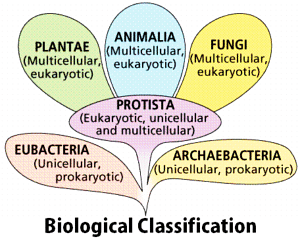Question:
Two kingdom classification was insufficient.
Majority of organisms did not fall into either of the categories in two kingdom classification.
Two kingdom classification was insufficient.
Majority of organisms did not fall into either of the categories in two kingdom classification.
Updated On: Jul 6, 2022
- If both assertion and reason are true and reason is the correct explanation of assertion
- If both assertion and reason are true but reason is not the correct explanation of assertion
- If assertion is true but reason is false
- If both assertion and reason are false
Hide Solution
Verified By Collegedunia
The Correct Option is A
Solution and Explanation
Two kingdom classification (founded by Linnaeus) worked well for a long time. But this system did not distinguish between the eukaryotes and prokaryotes, unicellular and multicellular organisms, photosyntheticand non-photosynthetic organisms. Although, classification of organisms (into plants and animals) was easily done and was easy to understand, but a large number of organisms did not fall into either category. Hence, the two kingdom classification used for a long time was found inadequate.
Was this answer helpful?
0
0
Top Questions on biological classification
- Which of the following microorganisms is used in the production of curd from milk?
- MHT CET - 2025
- Biology
- biological classification
- In a DNA molecule, which of the following base-pairings is correct?
- MHT CET - 2025
- Biology
- biological classification
- Which is not a prime element?
- MHT CET - 2025
- Biology
- biological classification
- Study the following and choose the incorrect combinations:
I. Phylum: Porifera, Special cells: Lasso cells, Example: Spongilla
II. Phylum: Cnidaria, Special cells: Stinging cells, Example: Hydra
III. Phylum: Ctenophora, Special cells: Choanocytes, Example: Pleurobrachia
IV. Phylum: Platyhelminthes, Special cells: Flame cells, Example: Fasciola- TS EAMCET - 2025
- Zoology
- biological classification
- Study the following and choose the correct combinations:

- TS EAMCET - 2025
- Zoology
- biological classification
View More Questions
Concepts Used:
Biological Classification
The process of grouping living organisms into categories is called biological classification. The most modern 5-kingdom classification was put ahead by an eminent scientist R.H.Whittaker. The five-kingdom classification is based on the criteria like cell structure, mode of nutrition, body form, and reproduction. One of the most important characteristics of this system is that it follows the evolutionary sequence of living organisms. The organisms are classified into distinct taxa or levels like Kingdom, Phylum, Division, Class, Order, Family, Genus, and Species. The 5 kingdoms are as follows:
